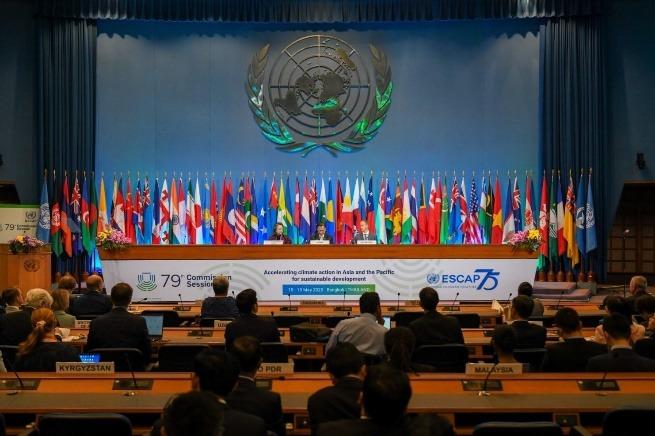 The United Nations Economic and Social Commission for Asia and the Pacific (ESCAP) opens its 79th session in Bangkok, Thailand, with global and regional leaders calling for urgent action to combat climate change and its dire impacts, on May 15, 2023. (PHOTO / ESCAP)Urgent actions are in real need to combat climate change and its dire impacts, according to the 79th session of the United Nations Economic and Social Commission for Asia and the Pacific held in Thailand this week.
The United Nations Economic and Social Commission for Asia and the Pacific (ESCAP) opens its 79th session in Bangkok, Thailand, with global and regional leaders calling for urgent action to combat climate change and its dire impacts, on May 15, 2023. (PHOTO / ESCAP)Urgent actions are in real need to combat climate change and its dire impacts, according to the 79th session of the United Nations Economic and Social Commission for Asia and the Pacific held in Thailand this week.
The environmental impacts of climate change in Asia and the Pacific are alarming, while most countries are still ill-prepared for multiple overlapping crises, according to a report by ESCAP released recently.
The costs of climate change are high. ESCAP estimates of annual average losses resulting from natural and biological hazards in Asia and the Pacific are approximately $780 billion
It showed that climate change poses major challenges to all strands of sustainable development in Asia and the Pacific. The region includes 13 of the 30 countries most vulnerable to climate impacts and without concerted action, it could see an additional 7.5 million people fall into poverty by 2030.
READ MORE: Climate crisis hits 'tipping point' as reports show irreversible harm
“Asia and the Pacific can set the pace of climate action in the decades to come. Most countries in the region have already pledged carbon neutrality goals towards mid-century. But we need to accelerate action, with steep reductions in emissions within the next few years,” said Antonio Guterres, United Nations Secretary-General at the meeting on May 15.
The costs of climate change are high. ESCAP estimates of annual average losses resulting from natural and biological hazards in Asia and the Pacific are approximately $780 billion.
As Asia-Pacific countries rebuild after COVID-19, the sub-regions are faced with climate related extreme weather events threatening resilient and sustainable development, according to the ESCAP.
For the Pacific, which is home to many small island developing states, the report said climate change remains the single greatest threat to livelihoods, sovereignty and existence.
Armida Salsiah Alisjahbana, United Nations Under-Secretary-General and Executive Secretary of ESCAP said the integrated nature of climate change calls for holistic, multisectoral solutions as well as targeted support.
“Each one of us and every aspect of our world is being affected. Those who are most exposed and have the fewest resources to respond to climate change, however, are the most vulnerable,” she added.
So far, China, Japan, South Korea and Russia have set national goals to achieve carbon neutrality by 2050 or 2060 and have been developing specific policies and roadmaps.
“Considering the various situation of the nations, although we shared some issues in common, but are having different responsibilities for the implementation of the Paris Treaty and archiving the aim of net-zero,” said Zhang Ming, Secretary-General, Shanghai Cooperation Organization in his keynote address on May 16.
“The melting ice and other challenges we’ve encountered now are resulted from climate change. Countries need to tackle those negative impacts from climate with joint hands, for pursuing sustainable development, protecting biodiversity and reserve the water resources,” Zhang said.
He said a very solid legislative framework and a mechanism, which are working properly so far, have been built under the support of SCO members. Zhang also emphasized that each state should be respected to have their own agenda of implementing their commitment to Paris Treaty.
At the opening ceremony of the session in Bangkok, Thai Prime Minister Prayut Chan-o-cha said Thailand supports cooperation in combating climate change at the regional level which is key to solving this problem.
He emphasized that climate action and regional cooperation need to be scaled up to strengthen capacities in responding and adapting to climate change.
“ESCAP’s work should be in synergy with and complement other regional and sub-regional cooperation frameworks. In addition, technology and innovation should be leveraged in the climate actions,” he said and noted that health risk management and public health preparedness will also help minimize and adapt to the impacts of climate change.
READ MORE: Southern Europe braces summer of drought for climate change
Under the theme “Accelerating climate action in Asia and the Pacific for sustainable development”, the session serves a platform for leaders to share solutions to both reduce the risks and impacts of climate change and foster ambitious climate action in Asia and the Pacific towards net-zero pathways and limit global temperature rise to no more than 1.5 degrees Celsius.
Zhang of SCO also noted that China in the past decade has listed ecological development as a major task in the country's overall plan and proposed building a "Beautiful China" as a grand goal for ecological progress. Eco-civilization was included in the Communist Party of China’s Constitution as a principle for development.
More than 880 participants from 61 member states, associate members and permanent observers as well as representatives from academia, international organizations, youth, business and civil society are attending the session.
Contact the writer at yangwanli@chinadaily.com.cn


